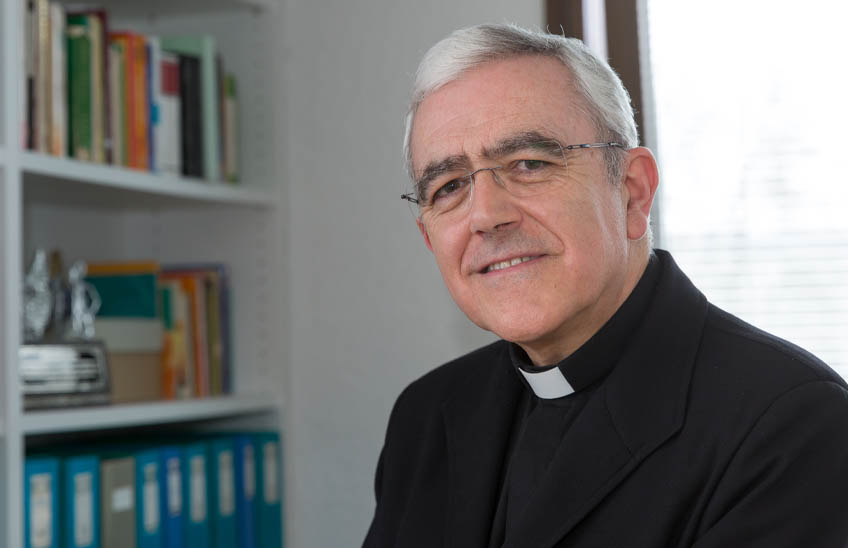"A professor of theology must be humble and magnanimous."
Francisco Varo gave his last class at the School of Theology surrounded by students, professors, colleagues, family and friends.

09 | 05 | 2025
Professor Francisco Varo gave his last class at the School of Theology on April 9. School of Theology. He did so surrounded by students, professors, colleagues, family and friends who did not want to miss the tribute organized on the occasion of the celebration of his 70th anniversary.
True to his custom with the students of the Hebrew subject , the class began with the recitation of the Lord's Prayer in Hebrew, in an introduction in which Professor Varo already anticipated the special tone of the meeting: a lesson that would combine academic content with personal reflections.
The topic chosen was biblical interpretation in medieval Jewish Spain (Sepharad), a research field that the professor has cultivated for years. Through a historical and philological journey, he analyzed the tensions between Karaites - who maintained that "what God has said He has said in the Bible and nothing else but the Bible" - and Rabbanites, for whom "there is also another means of transmission of divine revelation, which is the oral Torah reflected in the Talmud".
In the initial part of the session, Professor Varo also shared a retrospective staff on how his interest in these subjects was born. He recalled his childhood in Cordoba, his time in the parish of San Pedro and his fascination with the Hebrew and Arabic inscriptions he saw every day. "What could this Philosophy thing be that these people are working on?" he wondered at the time when he saw the statues of Seneca, Maimonides and Averroes.
His vocation for the study of the Bible, as he told us, was not immediate. When he finished theology in Rome, he responded almost jokingly that he wanted to study "anything but Scripture". However, he was assigned to precisely that specialization program. Antonio Miralles told me: "Well, you're going to do Scripture. And if you don't like it, you can change after fifteen days". In the end, he stayed. His training was completed with stays at the Hebrew University of Jerusalem, where he studied biblical Hebrew and Jewish culture in depth. His doctoral thesis in Trilingual Biblical Philology , directed by Carlos Carrete, focused on the Songs of the Servant and gave rise to subsequent publications on medieval Jewish exegesis.
In this interview Professor Varo recalls his years at the University and some anecdotes.

What is your earliest memory of the University?
When I came to study the licentiate degree in Theology, in 1982, recently ordained as a priest. The first contact with Pamplona was the day I arrived. I got off the train from Madrid, which arrived at eleven o'clock at night, and I found myself in a station in the middle of nowhere. A very kind man approached me and asked me if I was going to Pamplona, and I said yes. It was David Isaacs, who was then the director of the Institute of Education Sciences.
I confess that I was eager to do well and soon the licentiate degree, the doctorate and leave to continue my pastoral work. But the result was different.
And how did you decide to stay at the University?
While I was already at the School, I met one of the people who have had the greatest impact on me intellectually and academically, and also in my life as a priest. He was Professor José María Casciaro, who at that time was the director of the Sacred Scripture department . I liked his classes very much and, when I had to look for a director for my thesis , I went to him and he accepted.
So I began to do my thesis with him, at the same time that the work of translating and commenting on the Holy Bible, a commission that St. Josemaría had given to the School, was underway. Don José María was in charge of that project. When I began my doctorate, only three volumes of the Gospels had been published, the fourth was in progress, and there was still a lot to do. That is how Don José María, when I defended my thesis , offered me to stay and work at the School on the Bible project .
It was a challenge I had never considered taking on, but it seemed so attractive that I stayed. When I had already been working for a year, Don José María told me that they were going to need someone who knew Greek and Hebrew to continue with the translation. I knew almost nothing about Greek, let alone Hebrew. I started the Philology programs of study here at the University to advance with the work of the Bible, at the same time that I was class at the School. Then I went to Salamanca, to finish Philology, and there I did my thesis in Trilingual Biblical Philology . And then I returned to Pamplona.
How do you remember your first class?
I was very nervous. I was don José María's teaching assistant , and I spent hours and hours preparing for my first class . My goal was to fill 45 minutes of class by saying something coherent. I had the feeling that everything important I had to say took little more than 10 minutes. Now, my problem is to adjust to the time of the class.
What have you enjoyed most about your work at the University?
I have tried to unite the academic and priestly aspects of my time at the University. I have really enjoyed the challenges that have been put before me for my pastoral work. Being in a university open to all sciences and in continuous contact with professors, ideas and creative processes presents you with new challenges.
In addition, the students, different from one another and from different backgrounds, are always raising new questions. They are a continuous incentive to think, pray and reflect on how to make faith alive and active in the midst of our contemporary world.
Do you have any memories or anecdotes that you hold especially dear?
I remember teaching a class one day in the early afternoon. In the front row of the classroom there was a student who was nodding off; I could see him, but I didn't say anything. Then, suddenly, I saw him pull his papers away from the table and say, "Excuse me for a moment. He stopped the class, and what he did was to lie down on the table. And there he lay down to sleep, without any complexes. I left him, what was I going to do?
I also remember another anecdote. Years ago, I gave a class to students of the History of Communication subject , about the Divine Revelation as a communication process. Five minutes into the class, a student raised his hand and said: "I don't know why you are talking about Jesus Christ, if any educated person of our days knows that Jesus Christ never existed".
This question, which he clearly asked to provoke, got me thinking. I thought that, if this boy asked this question, many others would ask it, and I pondered how to answer him. This prompted me to gather materials and I published Rabbi. Jesus of Nazareth, which, in a way, is the answer to that question. And of course, any educated person knows that Jesus did exist.
If you had to give a committee, what would it be?
There are two qualities that must be present in a professor of theology: humility and magnanimity. The humility of knowing that we are facing a science that is beyond us and that we cannot completely control. And magnanimity, because we have before us a great challenge, which consists not only in giving a class, but also in teaching that Jesus Christ is the light of the nations, and that faith is a leaven that must be active.
The work of a theologian is not simply to look at the past and remember what other masters have said; it is a task of openness, where one must be willing to contribute to this society.


